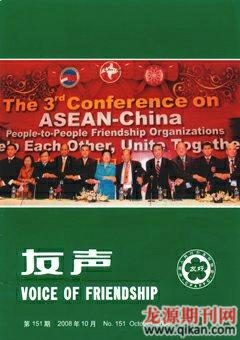German Delegation’s China Tour
Wang Wei
At the invitation of the CPAFFC, a delegation of the Association for Germany-China Friendship (AGCF) Stuttgart on a tour of investigation of environmental protection and energy conservation visited Beijing, Shanghai, Tianjin, Tangshan and Changzhou from March 22 to 30. The delegation was led by Mrs. Karin Roth, secretary of state of the German Federal Ministry of Transport, Building and Urban Affairs, and member of the Federal Assembly and the Presidium of the AGCF. Rainer Dold, president of the AGCF Stuttgart; vice mayor of Stuttgart; directors of the Environmental Protection Bureau of Stuttgart and of Frankfurt were among the members of the delegation.
The delegation paid an official call on Wang Guangtao, chairman of the Environment Protection and Resources Conservation Committee of the National Peoples Congress. Wang briefed the German guests about the progress China had made in environmental protection, energy conservation and reduction of emission since reform and opening up, urban construction and the challenges the country was facing in solving the housing problems for the people. Karin Roth made positive estimation of the achievements China had made in environmental protection and energy conservation, and held that China had potentials in standardizing energy-saving specification for new buildings, transforming existing buildings into energy-efficient ones and utilizing renewable energy resources. She hoped that Germany would fully cooperate with China in coping with climate changes.
Qiu Baoxing, vice minister of housing and urban-rural development, briefed the delegation about the coming Green Building Conference and the current situation and plan of building eco-cities in China.
Karin Roth said, Germany has accumulated rich experience in formulating standards for energy-efficient buildings. Every year China constructs new buildings of several billion square metres. She hoped that China would introduce Germanys advanced technical specification and standards. She gave an account of the new energy-saving technologies such as geothermal energy and wall solar energy plates that are widely used in German new buildings.
In Tangshan, the delegation visited the demonstration project of energy conservation transformation of the existing buildings in the Hebei No. 1 Residential Quarter. This Sino-German cooperative project, supported by the ministry of construction of the two countries and the Tangshan Municipal Government, is undertaken by German Gesellschaft fur Technische Zusammenarbeit (GTZ). Because of poor insulation and low efficiency of the heating system of existing Chinese buildings, energy consumption per unit is 2 to 3 times higher than that in the developed countries of the same latitude. This project has carried out building energy conservation transformation by reforming the buildings exterior walls structure, the windows and the heating facilities, and notably improved its insulation, heat preservation, sound insulation and dust prevention. Members of the delegation visited the houses of two residents. When seeing that the residents were satisfied with the results of the transformation and that more and more people living outside the demonstration residential quarter hope to transform their houses with their own funds, Roth felt very glad and encouraged, and fully affirmed the significance of this demonstration project.
The delegation visited the Changzhou Trina Solar Energy Co., Ltd. The company, a privately-run high-tech enterprise, is mainly engaged in research, development and production of photovoltaic products, chiefly solar battery plates that are exported to Europe and other places of the world, among which Germany is the largest importer of its products. Roth said, use of solar energy is very important for environmental protection, and hoped that the company would give more attention to open up domestic market for its products.
This was Roths first visit to Shanghai, though she had been to China five times. The delegation admired Shanghai, a mega city with a high population density of 20 million people, for its capability of calmly handling challenges it faces every day and developing the city in the mode adaptable to its conditions. When enjoying the night scene at the Bund and seeing that only half of the lights were on, they praised the measures Shanghai had taken to conserve energy and reduce emission.
In Tianjin, the delegation visited Siemens Water Technologies, where they listened to the briefing given by the executive of the company about sewage treatment, collection of recycled water and reuse of sludge. In Beijing the delegation visited the College of Urban and Environmental Sciences of Peking University, the German Centre and the German Friedrich Ebert Foundation.
Before the delegation left China, CPAFFC President Chen Haosu met with them and spoke highly of the efforts made by the AGCF over the years to promote Germany-China cooperation and urged relevant German departments and enterprises engaged in environmental protection to expand their cooperation with China. Chen hoped that China and Germany could have sincere dialogue in this field. Roth said, only by understanding Chinas huge economic size and current situation of development, can one really know how to carry out cooperation with China. She said, she understands Chinas position and views and is willing to make contribution to promoting Germany-China cooperation in this field.
During their visit in China, the delegation had contacts with Chinas scientific, technological, management and policy-making departments, conducted dialogue and in-depth exchanges in energy conservation and environmental protection. The members of the delegation said that the visit through which they got much information left a deep impression on them.
- Voice Of Friendship的其它文章
- Montenegrin Friends Praise China’s Achievement
- Delegation of University of Regina Visits China
- Former Japanese Ministers Masajuro Shiokawa and Kiyoshi Mizuno Visit China
- Astana——A Capital City for New Millennium
- 1150th Anniversary of Birth of Tajik Poet Abu Abdullah Rudaki Commemorated in Beijing
- CPAFFC President Chen Haosu Receives Hilal-i-Quaid-i-Azam Medal

